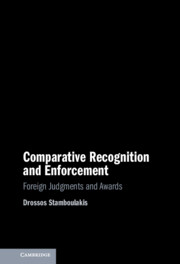Book contents
- Comparative Recognition and Enforcement
- Comparative Recognition and Enforcement
- Copyright page
- Contents
- Foreword
- Preface
- 1 Introduction
- Part I Transnational Recognition and Enforcement
- Part II Towards Increased Prospects for Judgments Recognition and Enforcement?
- 6 Overcoming Hurdles to Transnational Recognition and Enforcement
- 7 Legal Development
- 8 Towards ‘Transnationalised’ Recognition and Enforcement
- 9 Conclusion
- Bibliography
- Index
6 - Overcoming Hurdles to Transnational Recognition and Enforcement
from Part II - Towards Increased Prospects for Judgments Recognition and Enforcement?
Published online by Cambridge University Press: 10 November 2022
- Comparative Recognition and Enforcement
- Comparative Recognition and Enforcement
- Copyright page
- Contents
- Foreword
- Preface
- 1 Introduction
- Part I Transnational Recognition and Enforcement
- Part II Towards Increased Prospects for Judgments Recognition and Enforcement?
- 6 Overcoming Hurdles to Transnational Recognition and Enforcement
- 7 Legal Development
- 8 Towards ‘Transnationalised’ Recognition and Enforcement
- 9 Conclusion
- Bibliography
- Index
Summary
Chapter 6 commences by exploring the extent to which recognition and enforcement approaches are likely to inform each other over time. I do so by analysing the differences in legal tradition and approaches across states that have, historically, been seen as impediments to agreeing to a harmonised global framework promoting recognition and enforcement. While this argument has less resonance now that global judgments instruments have been formally adopted, it can still be generalised to suggest that these differences may inhibit the uptake of these instruments in and by national legislatures. To determine whether this is likely to be the case, I analyse the experience of the New York Convention (with respect to arbitral awards) and the Brussels Model (with respect to judgments) in overcoming perceived hurdles expressed to arise due to differences in legal tradition and approach (e.g. between civil and common law traditions).
The second factor analysed in Chapter 6 is whether divergent rationales underlying recognition and enforcement limit the extent to which experiences or lessons learnt in one approach may fruitfully extend to others.
Keywords
- Type
- Chapter
- Information
- Comparative Recognition and EnforcementForeign Judgments and Awards, pp. 153 - 182Publisher: Cambridge University PressPrint publication year: 2022

